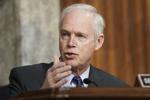
Gov. Tony Evers signed 267 bills into law during the past session, including five that received fewer than five Democratic votes in the Legislature.
Facing a Republican Legislature and a reelection bid, Democratic Gov. Tony Evers signed only a few bills this past session without broad support from his party, but they include one that could hinder his pledge to reduce prison populations.
Of the 267 measures he signed into law since the 2021-22 session began, five received five or fewer recorded Democratic votes between both chambers, according to the Legislative Reference Bureau. Bills that passed by a voice vote in both chambers are not included in the tally because lawmakers’ votes are not recorded.
Evers vetoed some of the most controversial Republican bills, including measures to revamp elections administration and give parents a greater role in their children’s education. But none of the bills he signed with minimal Democratic support in 2022 were responsible for extensive floor debates or packed committee rooms.
Just three of the measures he signed in 2022 — pertaining to eligibility for early release from prison and probation, a low-income education plan’s reach and chiropractic education — received five or fewer recorded Democratic votes in favor.
People are also reading…
There were only two such measures in 2021, one requiring the Department of Public Instruction to create a school expenditure portal and one regarding proceeds from a massive opiate litigation settlement, which Evers said included an unconstitutional provision.
The most crucial measure Evers signed into law without broad Democratic support was the 2021-23 biennial budget. Seven Democrats voted in favor of the budget, which Evers openly weighed vetoing for not spending enough on K-12 education.
Early release
While Evers campaigned in 2018 on cutting the prison population in half, he signed a measure in April prohibiting people convicted of violent felonies and misdemeanors from early discharge from probation and early release programs in prison.
The measure, 2021 Wisconsin Act 227, passed as Republicans zero in on crime in Wisconsin — especially the November incident in which a man drove his SUV through a Christmas parade in Waukesha just days after he was released on $1,000 bail in connection with a violent crime. Six people died and dozens more were injured in the parade incident, which Republicans blamed on lax Democratic jail policies.
“This bill is one tool that Wisconsin can put in its public safety toolbox to ensure that the tragedy in Waukesha will never be repeated in our state,” bill author Rep. Chuck Wichgers, R-Muskego, said in a statement for a January hearing.
Asked why Evers signed the bill, spokesperson Britt Cudaback said the new act ensures the “programs remain largely targeted toward nonviolent offenders.”
While the new restriction is only enforceable for people convicted after the bill’s enactment, Wisconsin Department of Corrections spokesperson John Beard said just under 20% of the prison population, or about 1,361 people, eligible for early release programs in November 2021 wouldn’t have been eligible had the new law been in effect.
“It should be noted that eligibility does not necessarily mean a person will be automatically released early from their sentence,” he added.
The same is true for about 20% of people on probation who are eligible for early discharge, Beard said.
The average cost for a person incarcerated in a DOC institution during fiscal year 2021 was about $44,000.
Just three Assembly Democrats voted for the measure, which the state Public Defender’s Office said would “place additional burdens on an already overcrowded prison system.”
“The early release program is a useful opportunity to achieve relief when you demonstrate success in a number of different programs that can be offered while you’re incarcerated,” Adam Plotkin, legislative liaison at the Public Defender’s Office, said in an interview. “So limiting access takes away some of that opportunity.”
Because the Senate took a voice vote on the bill, AB 842, Senate lawmakers’ votes weren’t tabulated.
But Sen. Lena Taylor, D-Milwaukee, blasted the measure at a March committee hearing, saying convicted offenders need more rehabilitative programming, not more time in prison without being eligible for early release.
“What would Jesus do? Not this bill,” she said.
Senate Majority Leader Devin LeMahieu, R-Oostburg, spokesperson Adam Gibbs declined to comment for this story.
Low-income education plan
In one of the tamer partisan battles over education this past session, Republicans proposed expanding an online education program beyond the low-income children in a predetermined six-district region during the 2022-23 school year if there’s capacity for other low-income students in other districts.
Originally, the program extended to the Green Bay Area Public School District, Lac du Flambeau No. 1 School District, Milwaukee Public Schools, North Crawford School District, Racine Unified School District, and Siren School District.
Sen. Chris Larson, D-Milwaukee, who voted against the measure, 2021 Wisconsin Act 215, said the state should instead have invested directly in schools with higher rates of students in poverty and increased state reimbursement for special education.
In a statement, Cudaback noted the bill had no registered opponents.
Chiropractic education
Evers signed a measure in April allowing the Chiropractic Society of Wisconsin — whose stance on COVID-19 led to Democratic critiques — and other eligible in-state or national organizations to sponsor chiropractors’ mandatory continuing education training.
Until Evers signed the measure, 2021 Wisconsin Act 253, the Wisconsin Chiropractors Association was the only state-based organization able to sponsor the training. Republicans said the proposal, which expands the number of organizations that can be a program sponsor, would level the playing field and increase competition.
“The governor signed this bill in order to create equity among chiropractic entities in the state in being able to provide continuing education programs,” Cudaback said. “Additionally, increasing the number of continuing education program sponsors may make continuing education programs more accessible and affordable for chiropractors, chiropractic technicians and chiropractic radiological technicians.”
Largely, the Democratic opposition to the measure came around the time the Chiropractic Society of Wisconsin hosted Vax-Con, an event featuring anti-vaccine proponents. The event’s featured speaker, Judy Mikovits of the conspiracy theory-laden video “Plandemic,” included a number of false and unsupported claims in her presentation, including that vaccines drive pandemics and contribute to the development of chronic disease, The Associated Press reported.
John Murray, executive director of the Wisconsin Chiropractic Association, told the AP that the event was an example of a small group of chiropractors diminishing the profession’s credibility.
At a hearing in April 2021, organization then-president Wade Anunson said in a statement, “We are not an anti-vaccine organization,” adding that the organization was against government mandates. But he did concede that its reputation led a state senator to withdraw as a co-sponsor.
That senator was Senate Minority Leader Janet Bewley, D-Mason, who said she initially thought the two Wisconsin chiropractic associations should be treated equally.
“Unfortunately I had to re-examine that belief when I learned that they not only sponsored and promoted a conference featuring anti-vaccine activists, but also arranged for continuing education credits for attendees,” she said in a statement.
School expenditure portal
The Department of Public Instruction must create an online portal displaying financial data from school districts, county children with disabilities education boards and independent charter schools beginning in 2023 under a measure Evers signed in November.
Republicans proposed the measure, 2021 Wisconsin Act 89, as a way for taxpayers to see how their money is spent. While no organizations lobbied against the measure, Democrats lambasted it for not applying to schools participating in voucher programs.
Several Democratic senators offered an amendment to extend the bill to schools receiving at least 80% of their annual revenue from students participating in voucher programs, but Republicans rejected the amendment, leading Democrats to reject the bill.
Cudaback noted the measure “was publicly supported by the Department of Public Instruction, school boards, and school administrators, among others.”
Opioid settlement
Despite considering part of the measure unconstitutional, Evers signed a bill in June 2021 requiring the state and Wisconsin counties to forge a settlement agreement stemming from litigation dozens of Wisconsin entities filed against opioid manufactures, distributors and retailers.
Evers said the 2021 Wisconsin Act 57 provision requiring the Legislature’s budget committee to sign off on any settlement was unconstitutional because it violated the state constitution’s separation of powers doctrine. He said that provision also needlessly delays settlements reaching Wisconsin communities.
“Despite these serious concerns, I am not willing to risk our ability to maximize the amount of settlement dollars available to Wisconsin by vetoing this bill in its entirety,” he said.
The law requires 70% of any settlements to go to local governments, with the other 30% going to the state. But all of the money must be spent on curbing opioid abuse.
Biennial budget
Though a total of seven Democrats voted in favor, the biennial budget remains the most critical measure Evers signed in the 2021-2022 session without broad support from his party.
Evers openly weighed vetoing the budget, which would have sent the measure back to the Legislature, for failing to spend enough on K-12 education, but ultimately signed the document in July. Strategists said at the time that, by signing the budget, Evers was positioning himself for re-election by providing a sizable surplus, reaching bipartisan agreement and moving the needle on priorities such as broadband expansion and education funding.
Evers had proposed a $91.2 billion budget, but hundreds of his policy items were immediately stripped by Republicans, who control the state’s powerful budget committee. He ended up signing the $87.3 billion 2021-23 biennial budget last summer.
While Republicans said the budget makes responsible investments and gives back to Wisconsin residents through tax cuts, Democratic lawmakers blasted the document as one rife with missed opportunities that fails to spend enough on education, broadband and more.
The GOP proposal passed both chambers, with three Democratic members of the Senate and four in the Assembly joining Republicans in favor of the budget.
While Evers used his partial veto power to make dozens of changes to the state’s 2019-21 budget, including increased education spending, he left the state’s current budget largely intact — including more than $2 billion in income tax cuts Republicans added thanks to an unprecedented surplus.
Evers has described the income tax cuts as fulfilling a campaign promise of cutting taxes for middle class families by 10%, a move criticized by Republicans as an effort to take credit for their work.
Editor’s note: This story corrects where Rep. Janet Bewley, D-Mason, lives.













